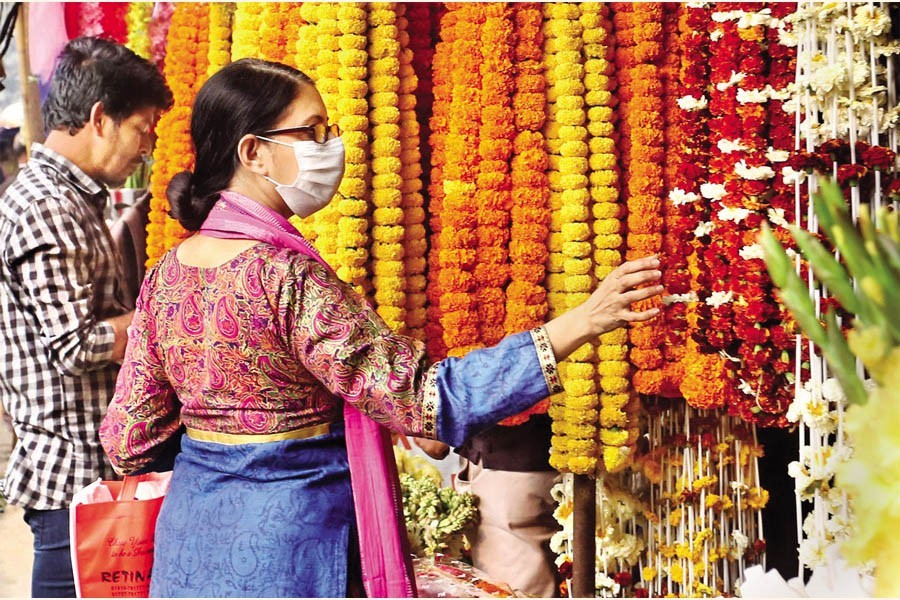The country's floriculture industry is struggling even in February this year, the peak trading month for cut flower and foliage trade, as the Covid-19 pandemic has squeezed the number of customers.
Flower traders said closure of educational institutions, ban on different expositions and fairs, absence of the month-long Bangla Academy Ekushey Boilmela (book fair), and decline in income of a large number of people are the key reasons behind their dull business.
In Bangladesh, February is the busiest time for both farmers and florists following some major occasions and celebrations, like - Pohela Falgun (first day of spring), Valentine's Day, 21st February (International Mother Language Day on Feb 21) and Ekushey Boimela.
According to the state-run Horticulture Foundation, local cut flower and foliage is a Tk 16-billion industry in terms of annual turnover, of which February month alone comprises Tk 5.0 billion.
"Orders for flowers on marriage, birthday and other occasions have increased slightly in recent weeks than those of the lockdown period. But our spring-time sale has declined 70-80 per cent compared to that of last year," said Abdur Rahman, proprietor of Adarsho Flower Shop at Shahbag in the city.
Mr Rahman said his daily sale was Tk 35,000-40,000 on an average during last February, and it reached Tk 60,000 on February 12, 13 and 14.
Pohela Falgun and Valentine's Day will be observed on the same day (February 14) this year.
"But our sale is yet to get any momentum. I so far sold flowers worth only Tk 5,500 today (Friday)," he lamented.
Anowar Hossain, proprietor of Shanta Pushpa Bitan - another flower shop in the same area, said he intentionally reduced his trade volume, sensing a dull business in this spring.
"I ordered just 100 pieces of gerbera a day for February 13 and 14, while I used to order 500-600 pieces ahead of Pohela Falgun or Valentine's Day."
Mr Hossain said he also squeezed orders for rose, tuberose, marigold, lotus, chrysanthemum, lilies, gypsy and other flowers and foliage.
Order for flower bouquets also declined by 70 per cent this year than that of last year.
The Dhaka University campus usually experienced a festive mode throughout the month of February, which is totally absent this year amid shutdown of the institution.
"There is no book fair or spring festival this year to attract youth gathering," he added.
President of Bangladesh Flower Society Abdur Rahim said closure of educational institutions and absence of different expositions and fairs have severely affected flower trade during this winter and spring.
Income of a large number of people also declined due to the pandemic, which is also taking toll on flower business, he noted.
The sector had been showing more than 10 per cent annual growth on an average for the last two decades until 2019.
The floriculture sector witnessed a 30-40 per cent negative growth in last one year, he added.
Md Shaiful Islam, president of National Nursery Society of Bangladesh - a platform of the country's nursery-related associations, said farmers in Jashore, Kushtia, Dhaka, Chattogram, Rangpur and Bogura regions have been facing a tough situation since March 2020.
The farmers' sale has increased to some extent in recent weeks, but it is not enough to cover their loss, he noted.
The Department of Agriculture Extension (DAE) Horticulture Wing data showed that the country produces 3.2-3.3 billion pieces of flowers commercially per year.
More than 3,500 hectares of land have been brought under floriculture on a commercial basis until 2020.
Currently, more than 28,000 farmers are engaged in cultivating flowers, and some 0.2 million people are totally dependent on this sector, according to the DAE.


